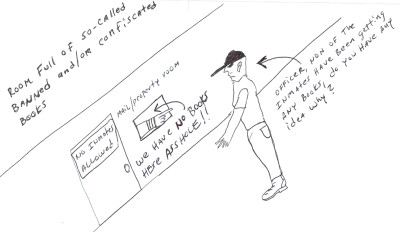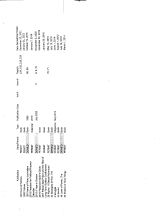
Prison Banned Books Week: Analyzing the Pennsylvania Ban list

Yesterday we published a recent prison book ban list from North Carolina. Today we will analyze and publish a banned literature list from the Pennsylvania Department of Corrections.
The state of Pennsylvania holds around 40,000 people in its prisons, compared to 30,000 in North Carolina. Yet Pennsylvania has only 398 currently banned titles compared to North Carolina’s 480. The Pennsylvania list is not refreshed each year, with some items being banned as far back as 2012, so it seems that overall North Carolina bans more books/publications. Across Pennsylvania school districts there were 186 banned books in 2022/2023 school year. Again, we see that prisons are banning more literature than schools are.

the Pennsylvania DOC banned book list
There is a lot of overlap between Pennsylvania and North Carolina’s lists. Pennsylvania seems more aggressive in banning sexual content, which accounted for at least 130 of the 398 titles on their list. (Note: On both lists we do not have reasons for the censorship, and we did not confirm the actual content of each item.) Unlike North Carolina, we did not see any “street novels” or “urban fiction” on the Pennsylvania list, so this was the biggest difference, perhaps accounting for the shorter list. Street novels rival pornography on the North Carolina ban list.
The Pennsylvania list also differs in that it lists titles that were permitted after being reviewed. There were 664 titles that were listed as permitted, giving greater insight into how they implement their rules.
Like North Carolina, tattoo books/magazines were often banned, along with topics like art, guns, hacking, drugs and martial arts. Pennsylvania had more prisoner advocacy related materials on their ban list (like Prison Health News), as well as newspapers that cater to prisoners. They also had more reference books and business related books for some reason (like Legal Forms for Starting and Owning Your Own Business). The obvious political motivations of censorship come through in items like Stop Law Enforcement Violence Against Women of Color and Trans People of Color.
While North Carolina seemed to only target The Final Call and Under Lock & Key there is a much broader list of newspapers that have certain issues banned in Pennsylvania. At the top of that list are The San Francisco Bayview, Workers World, and Under Lock & Key. Other than Under Lock & Key itself, there were no other items on the ban list that MIM Distributors distributes to prisoners, though some were on the permitted list. This mostly conforms with our records that show Under Lock & Key is almost the only thing that has been noted as censored or not received in recent years. The one item that shows up on our list a couple times for Pennsylvania censorship is our Maoist Glossary. As mentioned previously, most of our mail is never confirmed received or not.
Digital Mail Makes Physical Mail Harder
Censorship is challenging to track in the state of Pennsylvania. By law, authorities are required to send us notice of any censorship when it does occurs, but in practice this is uncommon if not rare. The overwhelming majority of our censorship cases in PA consist of mail simply disappearing in the system. What makes tracking censorship so challenging is that this missing mail includes letters that we send prisoners detailing the history of mail we’ve sent to them and when we sent it. Sometimes we have to resort to mailing the cellmates of the prisoners we were trying to contact. It’s amazing how well anger at the police can be communicated just through handwriting.
The fact that Pennsylvania seems to be quietly censoring our glossary aligns with the fact that their tablets provided through GTL do not offer any dictionaries among the 8805 titles available. Only 112 books are free on those tablets. These numbers are from Freedom of Information Act research by prisonbannedbooksweek.org, which also reveals that PA has a contract for $50,000,000.00 with GTL that includes kickbacks for “all annual revenues for music, e-messaging, games, lobby deposit fees and ebooks up to $4,350,000” at 22.5%. While kickbacks are interesting, note that at best the state is getting about 8% of the money back that they are giving to GTL to run their prison tablets. State bureaucrats are motivated to balance budgets, but it’s not like the state is making money on this deal. It is only GTL that is walking away with profits, not the state, and definitely not the families of prisoners who are paying exorbitant fees for these services. The comrade who sent us this ban list wrote:
“I bought this GTL tablet model number TG0802 in January of 2019 for damn near $160.00. But since ViaPath took over GTL a year ago or so, the price has dropped down to $80. But these are refurbished tablets. When I get released I will send it back to the company via the form paying only shipping and handling. Then you get a brand new one without all the D.O.C. settings and restrictions on them… Every song I bought will be on it too.”
It is nice that they have an option to allow you to keep your purchases after release from prison, but we wouldn’t recommend keeping a tablet with a cellular data receiver, camera, GPS and microphone on it from Global Tel*Link after your release.
Thanks to the new digital mail system, Pennsylvania DOC now has three different addresses to send mail to requiring one to identify the type of mail as either General Incoming Correspondence, Photographs, Publications, Photo Books, Official Documents, Original Transactional Documentation, Legal Mail (which can be either “For Attorneys” or “For Courts/Court Entity”), or Miscellaneous.
Under Lock & Key 83 is the only recent issue on the “DENIED” list in Pennsylvania for the reason “Information contained on page 15 speaks of rising up against authority.” Yet every recent issue has been censored for some prisoners, showing that this ban list is only a piece of the censorship going on in Pennsylvania. In recent years this censorship is a combination of mail just gone missing as mentioned above, or mail returned and stamped “REFUSED: Go to WWW.COR.PA.GOV”, implying that we are not following the mail rules. But when you go to their website, the mail rules clearly state that newspapers go to the facility, and many PA prisoners receive them this way. But alas, some mailroom supervisors disagree with the rules.
Despite all these confusing hoops that prison mail must go through, like elsewhere, drugs are more widespread than ever in Pennsylvania prisons. Rampant drug use and censored books and letters are just two of many indications of the failure of U.$. prisons to do anything positive for society.








